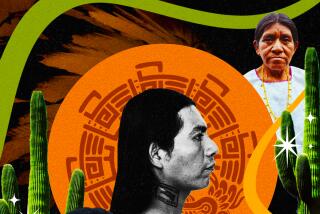Indian Woman Is Last Word on Language of the Atsugewi
- Share via
MONTGOMERY CREEK, Calif. — Tiny, frail Medie Webster, 87, is the sole remaining possessor of an age-old language.
She is one of just 200 Atsugewi (at-su-gay-we) Indians, whose ancestors for centuries hunted and gathered food in what is now Lassen Volcanic National Park. And she is the only Atsugewi who speaks fluently the tribal language.
“Sometimes I think about the old days when I was a little girl and all of us Atsugewis spoke our own language. We took life for granted and thought we would always be here living as our people did from the beginning of time,” sighed the old woman.
She told how her generation was “sent to the white man’s school and forced to learn the white man’s language and to forget the Indian ways. I only went as far as first grade. As I grew older I learned English but I kept speaking Atsugewi as well.”
Gradually, all the other older members of the tribe who spoke the language, including Medie’s husband of 60 years, Daniel, have died. Daniel Webster died in 1979 at age 87. Two years ago, when Ramsey Blake, in his late 80s, died, Medie was left as the only Atsugewi fluent in the tribal language, although other tribe members know some native expressions.
She lives with her grandson, Warren Conrad Jr., 24, in a modest cottage built 50 years ago by her husband on the edge of this hamlet at the end of a mile-long dirt road. Her home, 61 miles northwest of Lassen Park, is the only dwelling on the road.
“She talks to me in Atsugewi all the time,” said Conrad. “I have to interrupt her and say: ‘Gram, I don’t understand what you are saying. Please speak English.’ ”
Conrad said his grandmother “is like a person of another time. She tells me stories about the wagon days before cars, about old-time medicine men, about what it was like when she was a little girl, about the old ceremonial dances no longer performed. She sings to me in Atsugewi.”
Meanwhile, other members of the Atsugewi tribe try to keep their culture alive. For example, every summer for 16 years Medie Webster’s niece, Lillian Snooks, 61, has presented a program about the Atsugewis twice a day, five days a week, at the natural amphitheater behind the information center at the Manzanita Lake entrance to Lassen Park.
She always mentions the Atsugewi language. Snooks and her sister, Laverna Jenkins, 58, have been National Park Service rangers since 1972.
‘Old Ways Dying Fast’
“The old Indian ways of the Atsugewis are dying fast. That is why I give the programs about my people, a little-known Indian tribe, to help perpetuate what is still known about them before all is lost,” Snooks said.
She said that Atsugewi means pine tree people, a name that comes from the forests where the Indians have always lived.
The lakes and mountains in Lassen Park, she says, were the spiritual lakes and mountains of the Atsugewi. There were an estimated 2,000 Atsugewis when non-Indians first came to this area 150 years ago.
“We are losing our Indian ways so quickly. Another generation or two and the last traces of Atsugewi culture may well vanish from the face of the Earth,” Snooks said.
More to Read
Sign up for Essential California
The most important California stories and recommendations in your inbox every morning.
You may occasionally receive promotional content from the Los Angeles Times.













